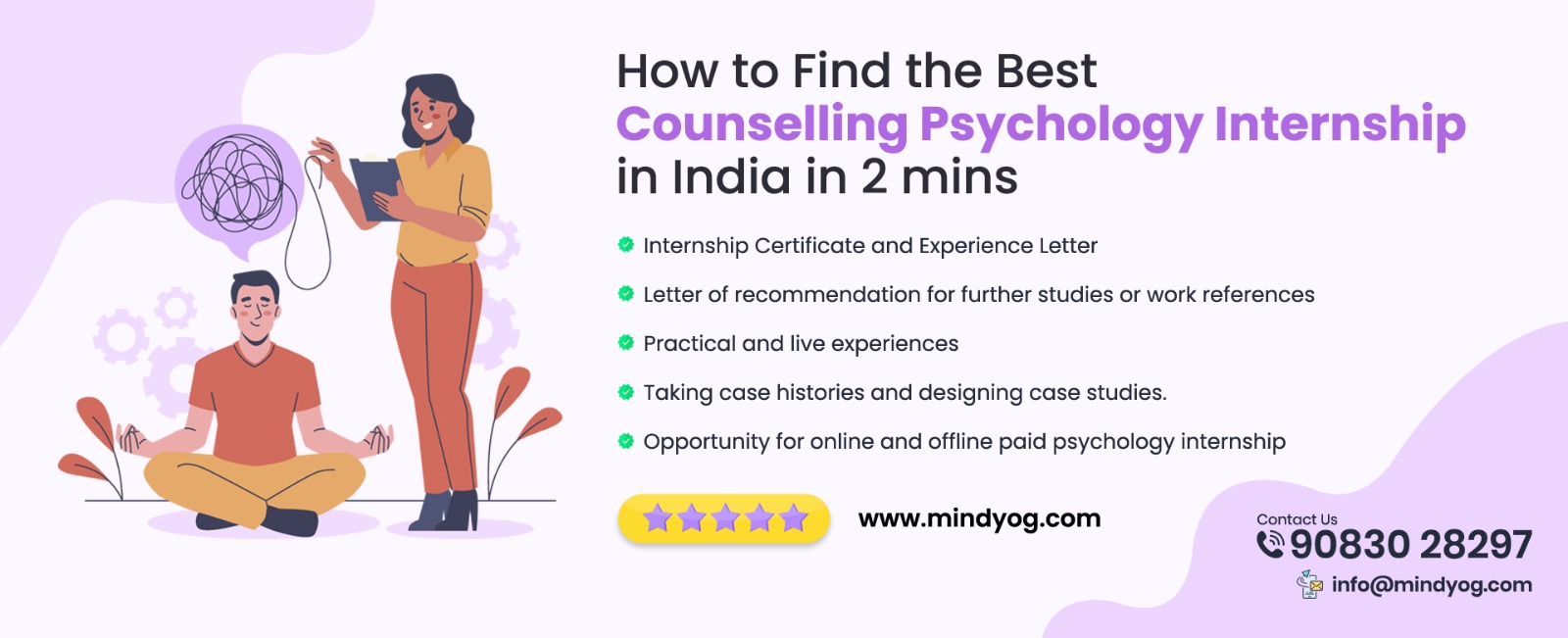Are you a psychology student or aspiring therapist looking for the right internship to launch your career? If yes, you’re not alone. Every year, thousands of students across India complete their undergraduate, postgraduate, or diploma courses in psychology and step into the world of internships.
But here’s the catch finding the best counselling psychology internship in India isn’t as easy as it sounds. Many students get stuck in programs that don’t provide real exposure, lack mentorship, or are purely theoretical. Others end up feeling lost about where to apply and how to evaluate opportunities.
This blog will act as your step-by-step guide to choosing the right counselling psychology internship in India. We’ll explore everything from what to look for in a program, to real-life examples, to red flags you should avoid.
By the end, you’ll have clarity on how to pick an internship that not only builds your resume but also shapes you into a confident counselling professional.
Why Internships Are Crucial in Counselling Psychology
Counselling psychology is a hands-on field. You don’t become a good counsellor just by reading textbooks; you learn by practicing real skills with real people under supervision.
An internship bridges the gap between theory and practice. Here’s why it matters:
- Practical Exposure: You learn how to apply CBT, DBT, mindfulness, or other therapy techniques in real-life sessions.
- Supervision & Mentorship: Experienced psychologists guide you, give feedback, and correct your approach.
- Confidence Building: You move from nervous classroom role-plays to handling actual cases.
- Networking: Internships help you connect with professionals, clinics, and organizations that can lead to job opportunities.
- Portfolio & Resume Strength: Employers and Ph.D. programs value internships with credible organizations.
Case Example:
Riya, an M.A. Psychology student in Kolkata, initially joined a short-term internship with an NGO. Unfortunately, most of her work involved administrative tasks like data entry. Later, she joined a counselling centre in Kolkata, Mindyog where she observed live sessions, co-facilitated therapy, and conducted group workshops. She realized the difference between a “certificate-only internship” and a “real skill-building internship”.
Step 1: Clarify Your Goals Before Searching
Not all internships are the same. Some focus on clinical exposure, some on research, while others emphasize community work.
Before applying, ask yourself:
- Do I want to practice one-on-one counselling?
- Do I want exposure to clinical disorders (depression, anxiety, trauma)?
- Am I more interested in research and assessments?
- Do I want to work with children, couples, or families?
- Do I prefer online or in-person internships?
👉 Example: If your dream is to open a private practice in the future, a clinical or counselling center internship is more valuable than a purely research-based one.
Step 2: Research Institutions Offering Internships
Now that you know your goals, start researching. Some top avenues in India include:
- Counselling Centers & Clinics
- Examples: MindYog (Kolkata), YourDOST, InnerHour
- Pros: Practical exposure, client observation, therapy sessions.
- Cons: Highly competitive; limited slots.
- Hospitals & Mental Health Institutions
- Examples: NIMHANS (Bangalore), AIIMS (Delhi), Institute of Mental Health (Hyderabad)
- Pros: Exposure to diverse cases and multi-disciplinary teams.
- Cons: Intense environment; may feel overwhelming.
- NGOs & Community Organizations
- Examples: Snehi, Vandrevala Foundation, Manas Foundation
- Pros: Focus on social impact, workshops, awareness programs.
- Cons: Sometimes less individual counselling exposure.
- Online Platforms & Startups
- Examples: BetterLYF, CounselIndia, iCounsel
- Pros: Flexible, online exposure, accessible to students in smaller cities.
- Cons: Limited in-person experience.
Step 3: Evaluate Internship Programs
Not all internships are created equal. Before joining, evaluate carefully. Look for:
✅ Mentorship Quality: Will you be guided by licensed psychologists?
✅ Structured Curriculum: Does the internship include training modules, role-plays, case discussions?
✅ Client Exposure: Will you observe or conduct sessions?
✅ Certificate Value: Is the organization credible?
✅ Duration & Time Commitment: Is it 1 month, 3 months, or 6 months?
✅ Feedback Mechanism: Will you get personalized feedback on your counselling style?
Red Flag Alert 🚩:
If an internship only promises a certificate without actual training, it’s not worth your time.
Step 4: Network and Ask for Recommendations
Sometimes the best internships are not advertised publicly.
- Ask Seniors & Alumni: They can share insider info on which organizations actually provide value.
- Join Psychology Forums & Groups: LinkedIn, Facebook groups like Psychology Students of India often post opportunities.
- Attend Webinars & Workshops: Many organizations announce internships during events.
Case Example:
Akash, a student from Kolkata, struggled to find good internships online. On Facebook, he connected with alumni who recommended Mindyog, the best place for psychology internship in Kolkata. That internship became his stepping stone to a counselling job.
Step 5: Apply Professionally
When applying, treat it like a job. Organizations prefer students who are serious.
- Craft a Strong Resume: Highlight coursework, skills (CBT, assessments, communication), and relevant workshops.
- Write a Personalized Cover Letter: Mention why you want to intern there, and how your goals align.
- Be Professional in Emails: Use formal language, attach documents properly, and proofread.
- Prepare for Interviews: Be ready to answer questions like:
- Why do you want to pursue counselling psychology?
- What therapeutic approaches are you familiar with?
- How do you handle stress and emotional situations?
Step 6: Make the Most of Your Internship
Getting selected is just the start. What you do during the internship matters more.
- Be Curious: Ask questions about therapy techniques.
- Observe Carefully: Note the counsellor’s tone, body language, and intervention style.
- Practice & Seek Feedback: Conduct mock sessions and ask for constructive criticism.
- Keep a Reflective Journal: Write daily learnings and insights—it helps during supervision.
- Network with Peers & Mentors: Build lasting professional connections.
Step 7: Assess Your Growth
At the end of the internship, reflect:
- Did I gain practical counselling exposure?
- Do I feel more confident handling clients?
- Did I build connections in the psychology field?
- Do I know which specialization (child, trauma, marriage counselling) excites me?
If the answer is yes, you’ve had a successful internship. If not, take the learnings and choose better next time.
Common Mistakes to Avoid
- Choosing Certificate-Only Internships: Don’t fall for attractive certificates with zero exposure.
- Not Clarifying Expectations: Always ask what the internship includes before joining.
- Overcommitting: Don’t take too many internships at once; depth matters more than numbers.
- Ignoring Online Options: If you live in a smaller city, online internships can still give quality exposure.
Real-Life Success Stories
Case 1: Shreya’s Journey (Masters Student, Bangalore)
Shreya wanted to specialize in child psychology. She applied to MindYog’s internship program where she got to sit in during play therapy sessions and co-conduct workshops for parents. After her internship, she was confident enough to design her own child behaviour modification program.
Case 2: Arjun’s Journey (BA Student, Kolkata)
Arjun wasn’t sure if he wanted to pursue clinical psychology or counselling. During his internship with an NGO, he interacted with survivors of domestic abuse. The experience gave him clarity that counselling psychology, rather than clinical pathology, was his passion.
Finding the best counselling psychology internship in India requires planning, research, and self-awareness. Remember, the right internship is not about the certificate, it’s about the skills, mentorship, and confidence you gain.
As you move forward, don’t settle for “just any internship.” Choose one that aligns with your career goals, challenges you, and truly prepares you for the counselling profession.
Are you ready to kickstart your career in counselling psychology with the right internship?
At MindYog, we offer structured, mentor-driven internship programs that provide real counselling exposure, supervision by licensed psychologists, and skill-based workshops. Whether you’re a BA, MA, or M.Phil student, our internships are designed to help you grow into a confident professional.
👉 Apply today for MindYog’s Counselling Psychology Internship and take the first step toward becoming a skilled, empathetic counsellor.



